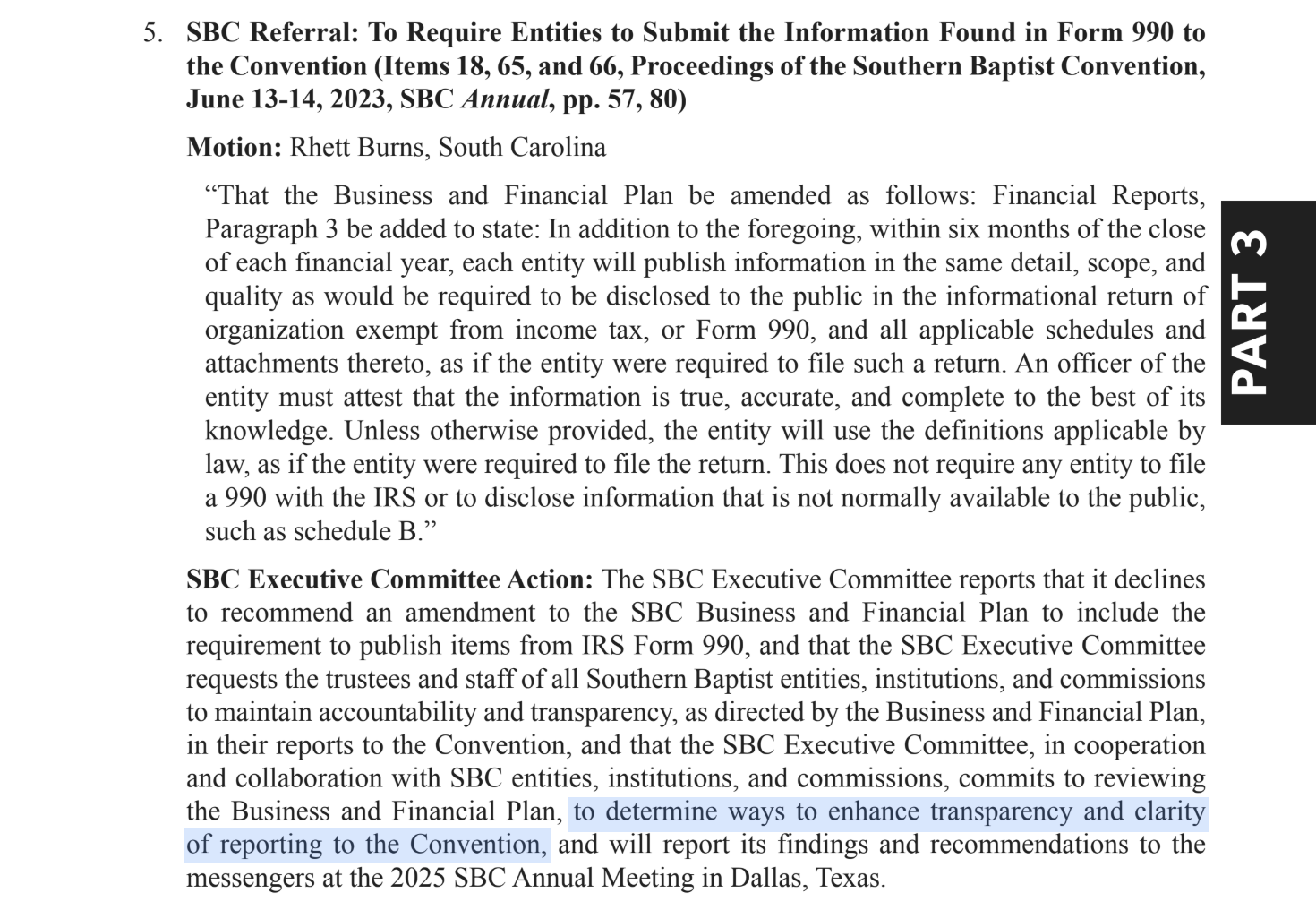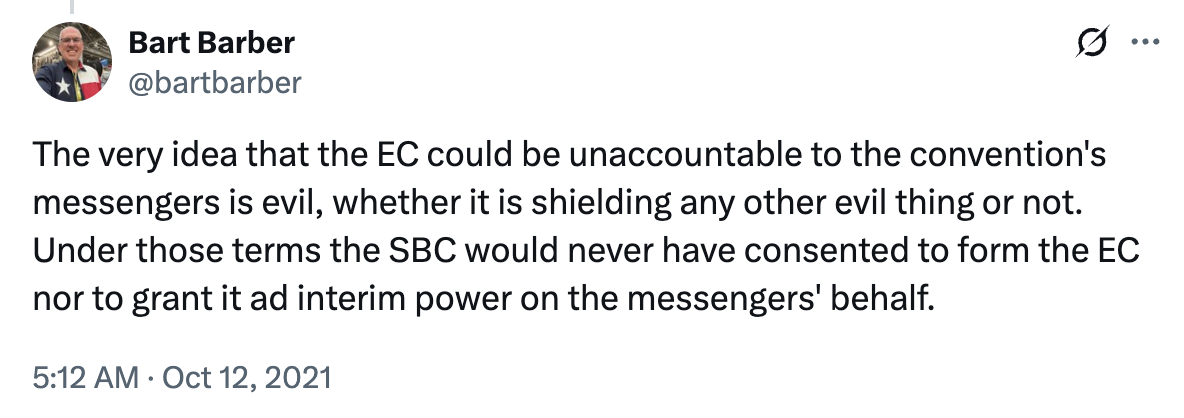The Executive Committee Must Stop Stonewalling and Let the Messengers Vote on Financial Transparency.
One of the beautiful things about being a Southern Baptist is that our churches voluntarily cooperate with thousands of other churches through the Cooperative Program for the sake of the gospel and the Great Commission.
I remember learning about the Lottie Moon and Annie Armstrong offerings at a young age and being captivated by missions efforts worldwide, all empowered by the Cooperative Program dollars from thousands of churches across all 50 states.
The funds that churches and individuals give to the Cooperative Program are directed to worldwide missions, theological education, and ministry support for local bodies of believers. This model gives us economies of scale that small churches nationwide could only dream about if they were working alone.
But what do you do as a local Southern Baptist church when you don’t know where your money is going? How do you allocate your congregation’s limited resources when you suspect that maybe reaching the United States and the world for Christ isn’t top of mind for the institutions requesting your money and demanding your unquestioning and dutifully silent trust?
Many local churches are in this exact predicament.
After the sex abuse “apocalypse” that wasn’t, the SBC is still “indemnifying” Guidepost solutions to the tune of $2 million per year and paying legal expenses for them as well.
We don’t know the salary scales, conflicts of interest, and other important financial information for our major entities, and you will be stonewalled if you ask for them.
The SBC has a billion-dollar budget, an amount that most normal people can’t even conceptualize, yet a few million-dollar lawsuits are making the Executive Committee insolvent.
Can you fault the faithful congregants and pastors who just want to know a little more about what they’re funding with their tithes?
Rhett Burns, a pastor from South Carolina, made a motion two years ago to require the entities of the Southern Baptist Convention to publish the equivalent of a Form 990 each year in the Book of Reports. Form 990 is the document that all other 501(c)(3) organizations are required to file with the IRS. While the motion does not require SBC entities to file with the IRS, the 990 is the base standard of accountability and transparency for public charities, and many charities file more details than that to assure their donors that their money is being managed well.
Pastor Burns simply asks for the SBC entities to meet the lowest bar of accountability to the Convention of churches they serve.
The Executive Committee and the Committee on Order of Business had the opportunity to bring this motion to the messengers and allow open debate. But rather than do that, they pushed it to the Executive Committee to respond in the next year’s reports. The response is shown below and on page 166 of the 2024 SBC Annual:

I will remind my brothers that we say we are a convention of churches that voluntarily cooperate for the sake of the gospel. Our annual meeting is the only time that the Southern Baptist Convention exists–two to three days out of the entire year–and the headquarters of the Convention is the local church.
But why are the convention leaders enforcing top-down standards for “enhanced transparency” (that aren’t actually more transparent) and refusing to bring Pastor Burns’s clear, simple, and conservative motion to the floor?
Brothers, we are not Presbyterians! If the headquarters is the local church, let the local churches debate a simple motion on the floor instead of pushing it to the very committee from which we want accountability and transparency!
What’s fascinating about the financial transparency debacle is that the SBC leaders were ostensibly in favor of transparency just a few years ago when it came to waiving attorney-client privilege for the Executive Committee. But now they don’t want more transparency regarding how they’re spending your money? It’s an untenable argument.
As a former President of the SBC, Bart Barber, said regarding transparency from the Executive Committee, “The point is that the @SBCExecComm cannot lie beyond the investigatory power of the Southern Baptist Convention. But if the EC gets to determine the terms of how it is investigated or which materials are or are not subject to investigation, then the EC effectively lies beyond the investigatory power of the SBC. ”

To be clear, waiving attorney-client privilege was a bad idea, and the SBC messengers were emotionally manipulated into instructing the EC to do so by disengenuous leaders, led by Russell Moore, who whipped up a mob.
However, the principle stands: SBC entities, including the EC, are not beyond the reach of investigation, instruction, and accountability to the Convention.
Barber added that such a notion is, in fact, “evil.”

There aren’t many SBC-reform issues on which I agree with Barber, but this is one of them, as applied to financial transparency. If the messengers could instruct the EC to waive ACP, they could certainly instruct the EC to require increased financial transparency from our entities. Let’s pray it doesn’t have to come to that.
When it came to the sexual abuse “crisis,” those at the top say we need to burn it all down to find the less than 0.000786% instance of sexual abuse among the 28,000,000 members of SBC churches in the Convention (in total, “over the 20-year period they surveyed”).
But when we ask for numbers on a piece of paper and for our leaders to answer a few extra questions about their financial operations, we hear that “we’re already providing all that information” and that “answering those questions is too burdensome” all at once.
Well, if we’re already putting that information out there and it’s too burdensome to put it on the equivalent of a 990, I’m not sure what to say other than “that math don’t math.”
In June of this year, the Executive Committee will release a shiny new Business and Financial Plan that they claim will “enhance transparency,” as if we need to add some features to the already transparent process of financial disclosure. We only wanted a slight change to the plan, not a complete overhaul.
At best, this is a confusing move.
At worst, this is disingenuous: Cloaking decreased transparency as enhanced transparency with an entire plan rewrite.
As Burns explains, “If the new plan is adopted, messengers will lose all access to records and details. They will only have a right to staff’s ‘descriptions’ of compensation processes—on request, filtered through confidentiality hoops. They will lose access to records on income, expenditures, debts, reserves, and operating balances. In other words, again, this change codifies the current system’s failures.”
This reeks of the Orwellian naming of bills in Congress to deflect criticism and beat opponents of the bills over the head–after all, who wants to argue against enhanced transparency? Maybe I’m overreacting. Surely the platform wants to tell you what they’re paying their top executives and seminary professors, and they’ll answer your questions if you simply reach out. I’ve had a different experience, but I welcome you to attempt it for your edification.
This is why Rhett Burns will propose his financial transparency motion again in 2025, even though it may be ruled out of order. Technically, it would be a second motion dealing with the same business as the Executive Committee’s recommendation.
This means your chance to be heard, and to help SBC churches secure the financial tranparency they deserve, is during this committee report.
The messengers must vote on the Executive Committee’s recommendation, but I’ll let you in on a little-known secret: You don’t have to vote yes.
You can debate and amend the committee’s recommendation, which is precisely what I’m calling anyone and everyone to do.
You have the opportunity to bring this back to basic financial transparency. You can speak against the Executive Committee’s recommendation for the sake of your hard-earned tithes and for the sake of the SBC’s healthy cooperation.
As Pastor Burns has summarized, his motion is “normal, simple, and Baptist.” It deserves a vote.
I hope you’ll do it. Why? Because this is God’s money. And it’s time we act like it.
Share This Story

